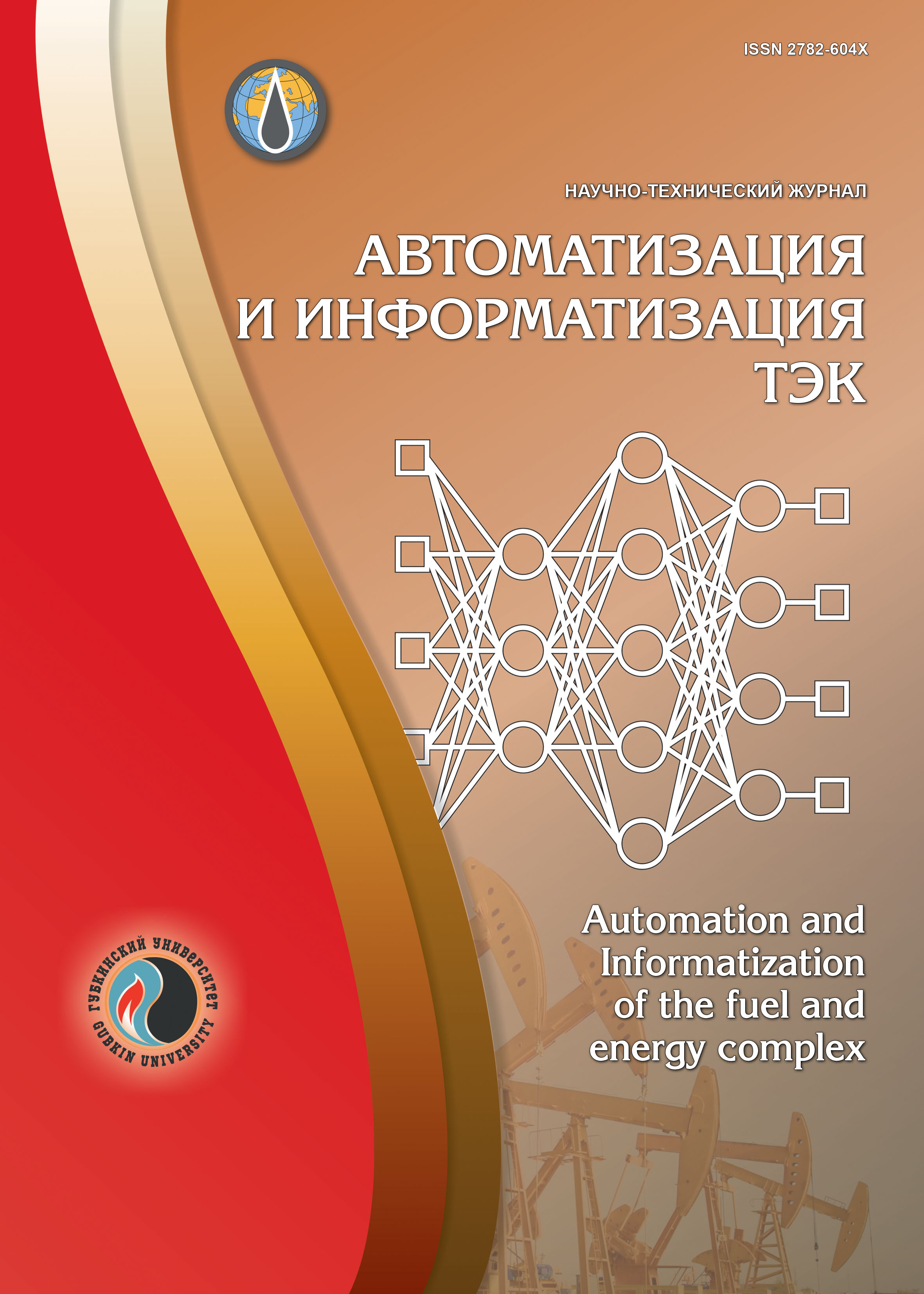Scientific and technical journal
«Automation and Informatization of the fuel and energy complex»
ISSN 0132-2222

Development of a neuro-fuzzy model for modeling hard-to-formalize processes of heat supply systems
UDC: 519.853
DOI: -
Authors:
1 N.M. Fedorovsky Polar State University, Norilsk, Russia
2 University of Tyumen, Tyumen, Russia
3 GAU of Northern Trans-Urals, Tyumen, Russia
4 Sibilink, Tyumen, Russia
5 Industrial University of Tyumen, Tyumen, Russia
Keywords: 4GDH, digital technologies, heating system, control system, control algorithm, thermodynamic processes, mathematical model, fuzzy logics, neuro-fuzzy model, simulation modeling
Annotation:
Thermodynamic processes that occur in pipeline heating systems are of interest for studying the flow of these processes in closed systems. The development of digital technologies, the emergence of scientific and technical innovations and their integration into the existing heating systems lead to the necessity of rethinking old decisions and adopting new technologies and approaches to heating systems diagnosing in the whole. When designing modern fourth generation (4GDH) heating systems, it is important to take into account the experience of various artificial intelligence methods, including Big Data technology, to analyze the processes occurring within the system and predict the impact of these processes on the overall system failure. The article emphasizes that future diagnostic systems will include Big Data technologies as part of their "information base" which will allow for a separate consideration of the physical and mathematical processes occurring in pipeline networks and the creation of mathematical models of these processes. It will allow the prediction of the impact of thermodynamic processes on the pipeline network state. Due to the complexity of the representation of single-phase and multi-phase processes occurring in heating systems, it is necessary to provide for the creation of a unique mathematical apparatus based on approaches of fuzzy logic. Solutions are proposed for the development of neuro-fuzzy modeling of heat supply systems’ processes that are hard to formalize.
Bibliography:
1. Otsenka tekhnicheskogo sostoyaniya teplovykh setey v RF / N.M. Popova, V.E. Taran, N.A. Petrikeeva, D.M. Chudinov // Gradostroitel'stvo. Infrastruktura. Kommunikatsii. – 2021. – № 1(22). – S. 16–21.2. Sorokin A.M. Monitoring sistem teplosnabzheniya // Vestn. Volgograd. gos. arkhitekturno-stroit. un-ta. Ser.: Str-vo i arkhitektura. – 2022. – № 2(87). – S. 90–98.
3. Kanev S.N., Toropkov S.A. Sovremennye sistemy teplosnabzheniya: problemy i puti ikh resheniya // Uchenye zametki TOGU. – 2013. – T. 4, № 4. – S. 1799–1807.
4. Romaskevich S.A. Analiz problem raboty sistem teplosnabzheniya i obosnovanie ikh modernizatsii // Prioritetnye napravleniya innovatsionnoy deyatel'nosti v prom-sti: sb. nauch. st. X mezhdunar. nauch. konf., Kazan', 30–31 okt. 2021 g.: v 2 ch. Ch. 1. – Kazan': Konvert, 2021. – S. 125–126.
5. Petrov A.M., Popov A.N. Razrabotka metoda matematicheskogo modelirovaniya termodinamicheskikh protsessov odnofaznykh potokov naruzhnykh setey teplosnabzheniya // Str-vo i tekhnogennaya bezopasnost'. – 2022. – № 26(78). – S. 59–63.
6. Petrov A.M., Popov A.N., Kuzyakov O.N. Sovershenstvovanie arkhitektury intellektual'nykh sistem upravleniya // Avtomatizatsiya i informatizatsiya TEK. – 2023. – № 4(597). – S. 15–22. – DOI: 10.33285/2782-604X-2023-4(597)-15-22
7. Katasev A.S. Neyronechetkaya model' i programmnyy kompleks avtomatizatsii formirovaniya nechetkikh pravil dlya otsenki sostoyaniya ob"ektov // Avtomatizatsiya protsessov upravleniya. – 2019. – № 1(55). – S. 21–29.
8. Rybina G.V., Rybin V.M., Parondzhanov S.S. Intellektual'nye sistemy upravleniya: novye arkhitektury // Informatsionno-izmeritel'nye i upravlyayushchie sistemy. – 2015. – T. 13, № 8. – S. 15–20.
9. A self-partitioning local neuro fuzzy model for short-term load forecasting in smart grids / Z. Tavassoli-Hojati, S.F. Ghaderi, H. Iranmanesh [et al.] // Energy. – 2020. – Vol. 199. – DOI: 10.1016/j.energy.2020.117514
10. Bobyr M.V., Emelyanov S.G. A nonlinear method of learning neuro-fuzzy models for dynamic control systems // Applied Soft Computing. – 2020. – Vol. 88. – DOI: 10.1016/j.asoc.2019.106030
11. New generation neurocomputing learning coupled with a hybrid neuro-fuzzy model for quantifying water quality index variable: A case study from Saudi Arabia / M.S. Manzar, M. Benaafi, R. Costache [et al.] // Ecological Informatics. – 2022. – Vol. 70. – DOI: 10.1016/j.ecoinf.2022.101696
12. Artificial neural networks and adaptive neuro-fuzzy inference system in energy modeling of agricultural products / A. Nabavi-Pelesaraei, S. Rafiee, F. Hosseini-Fashami, Kwok-wing Chau // Predictive Modelling for Energy Management and Power Systems Engineering. – Elsevier, 2021. – Chapter 11. – P. 299–334. – DOI: 10.1016/B978-0-12-817772-3.00011-2
13. System identification using neuro fuzzy approach for IoT application / R.K. Pattanaik, S.K. Mohapatra, M.N. Mohanty, B.K. Pattanayak // Measurement: Sensors. – 2022. – Vol. 24. – DOI: 10.1016/j.measen.2022.100485
14. Buy Chyong An. Razrabotka intellektual'nykh sistem modelirovaniya slaboformalizuemykh protsessov na osnove neyro-nechetkikh modeley: dis. … kand. tekhn. nauk: 05.13.01. – M., 2022. – 133 s.
15. Petrov A., Popov A., Molotok A. Development of a laboratory installation of a digital measuring system for visualization of internal pipeline processes // J. of Physics: Conf. Series. – 2020. – Vol. 1614. Int. Scientific Conf. Energy Management of Municipal Facilities and Sustainable Energy Technologies, Voronezh, Russian Federation, Dec. 10–13, 2019. – DOI: 10.1088/1742-6596/1614/1/012036